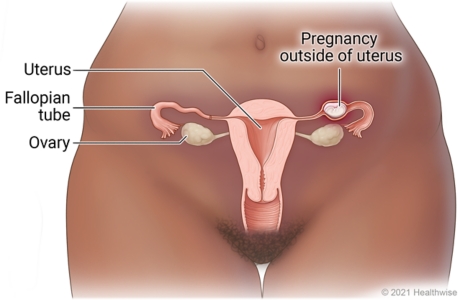
Ectopic Pregnancy: Causes, Symptoms & Treatments
Ectopic pregnancy is a medical condition where a fertilized egg implants and grows outside the main cavity of the uterus, most commonly in one of the fallopian tubes, which is why it’s often called a tubal pregnancy. Since the fallopian tubes are not designed to host the growth of a fetus, this condition cannot proceed normally and poses serious health risks to the mother if not treated promptly. Recognizing the signs and understanding the importance of immediate medical attention are crucial for managing ectopic pregnancies.
Causes and Risk Factors
While the exact cause of an ectopic pregnancy is not always clear, several factors may increase the risk:
- Previous ectopic pregnancy
- Inflammation or infection: Conditions like pelvic inflammatory disease (PID), often caused by sexually transmitted infections (STIs) like chlamydia or gonorrhea, can damage the fallopian tubes.
- Fertility treatments: Such as in vitro fertilization (IVF).
- Surgery on the pelvic area or fallopian tubes can lead to scar tissue that might block or slow the movement of a fertilized egg.
- Contraceptive methods: Pregnancy while using an intrauterine device (IUD) or after tubal ligation is rare but increases the risk of being ectopic.
- Smoking: Women who smoke or have smoked in the past have a higher risk of ectopic pregnancy.
Symptoms
Early signs of ectopic pregnancy may mimic those of a normal early pregnancy, including missed periods, breast tenderness, and nausea. However, unique symptoms that may indicate an ectopic pregnancy include:
- Sharp or stabbing pain in the abdomen or pelvis, which may vary in intensity and can be felt on one side. The pain may also radiate to the shoulder if bleeding into the abdomen has occurred.
- Vaginal bleeding that might appear differently from a regular period.
- Gastrointestinal symptoms
- Dizziness, weakness, or fainting due to internal bleeding.
- Shoulder pain caused by bleeding into the abdomen under the diaphragm.
Diagnosis
Ectopic pregnancies are diagnosed through a combination of methods:
- Pelvic examination to identify pain, tenderness, or a mass in the abdomen.
- Ultrasound imaging, particularly transvaginal ultrasound, to view the location of the pregnancy.
- Blood tests to measure the levels of human chorionic gonadotropin (hCG) and progesterone.
Treatment
Treatment for an ectopic pregnancy depends on how early the pregnancy is detected and the patient’s condition but may include:
- Medication: Methotrexate can be used to stop cell growth and dissolve existing cells if the ectopic pregnancy is detected early and there’s no risk of rupture.
- Surgery: Laparoscopic surgery (using a laparoscope) may be necessary to remove the ectopic pregnancy and repair or remove the affected fallopian tube if the pregnancy is more advanced or if there’s a risk of rupture.
- Monitoring: In very early cases and when hCG levels are very low and falling, careful monitoring may be an option, as some ectopic pregnancies resolve on their own.
Importance of Early Detection
Early detection and treatment of ectopic pregnancies are critical to prevent potentially life-threatening complications, such as fallopian tube rupture, which can lead to significant internal bleeding. Women who experience any symptoms associated with ectopic pregnancy or who are at risk should seek medical attention immediately.
Conclusion
Ectopic pregnancy is a serious condition that underscores the importance of early pregnancy monitoring and prompt medical care for any suspected pregnancy complications. With early detection and treatment, the risks associated with ectopic pregnancies can be significantly reduced, highlighting the importance of awareness and quick action.
To book online select the date and time that suits you best – alternatively, please contact us with any questions via the chat, call or email links provided.
Telephone: 020 7101 3377

